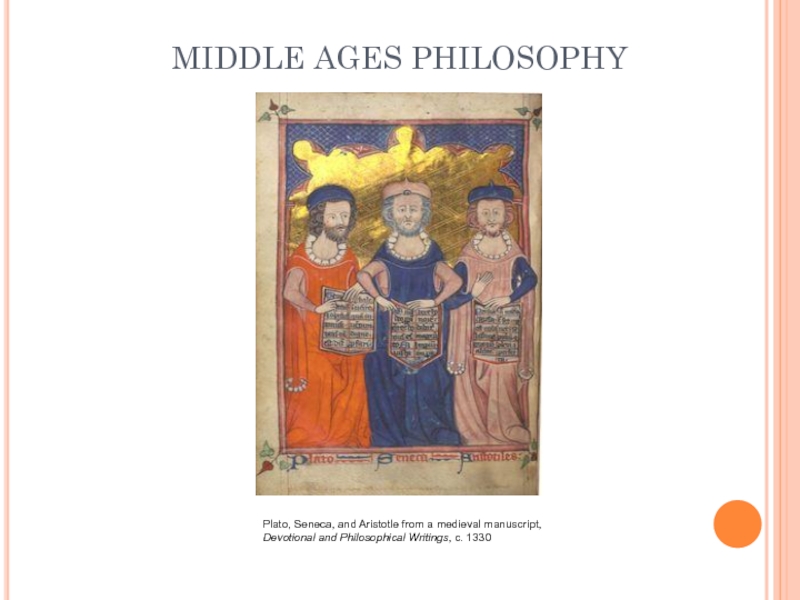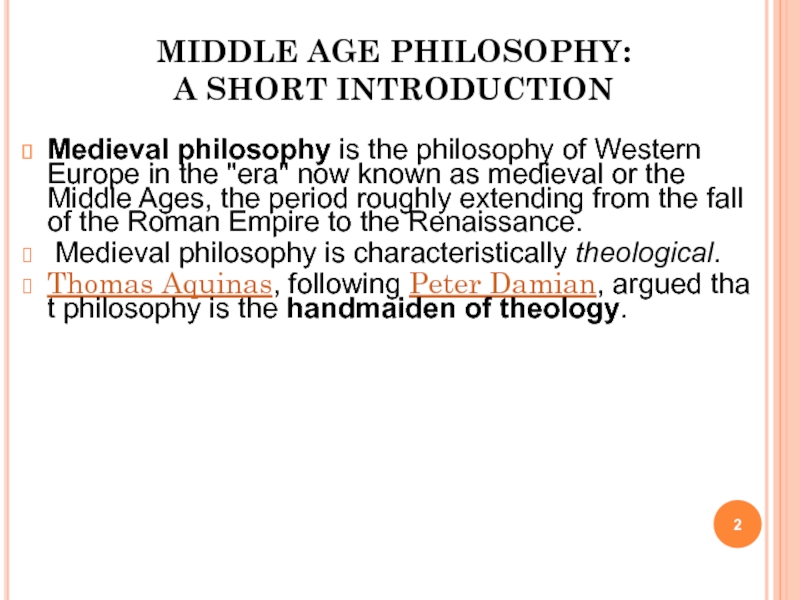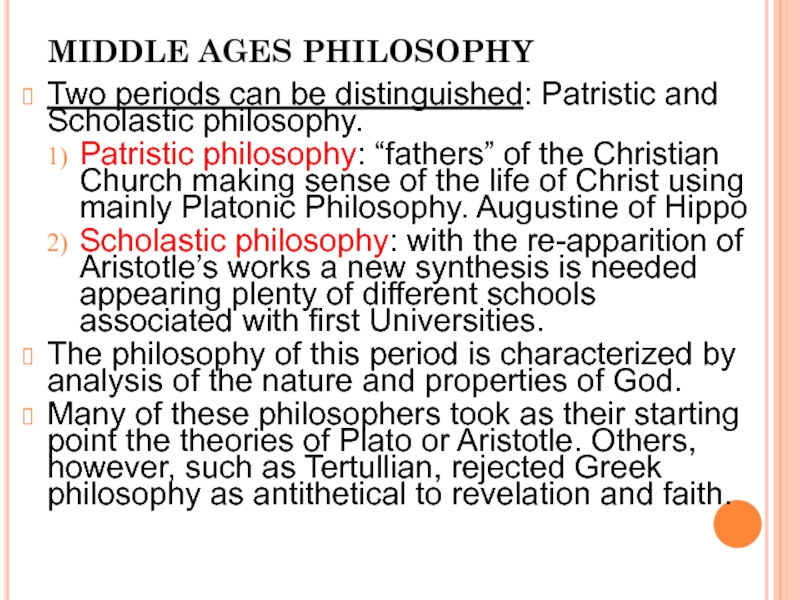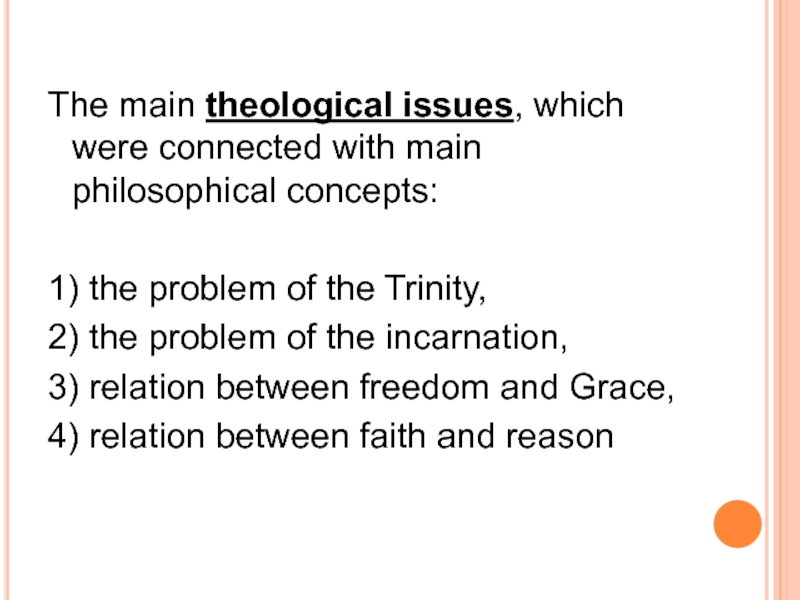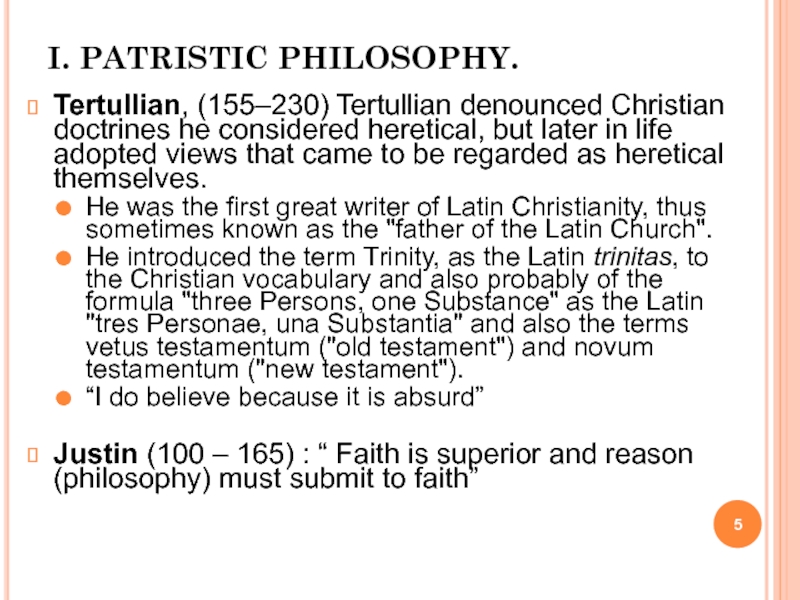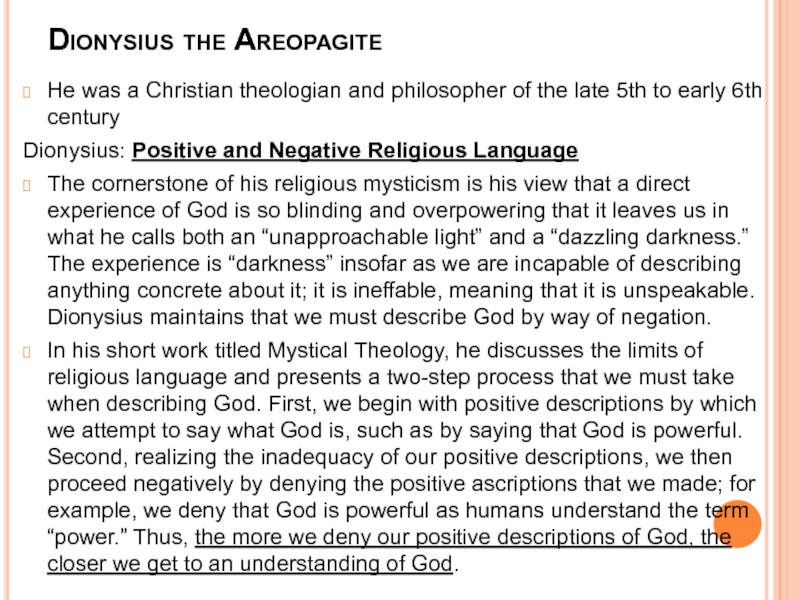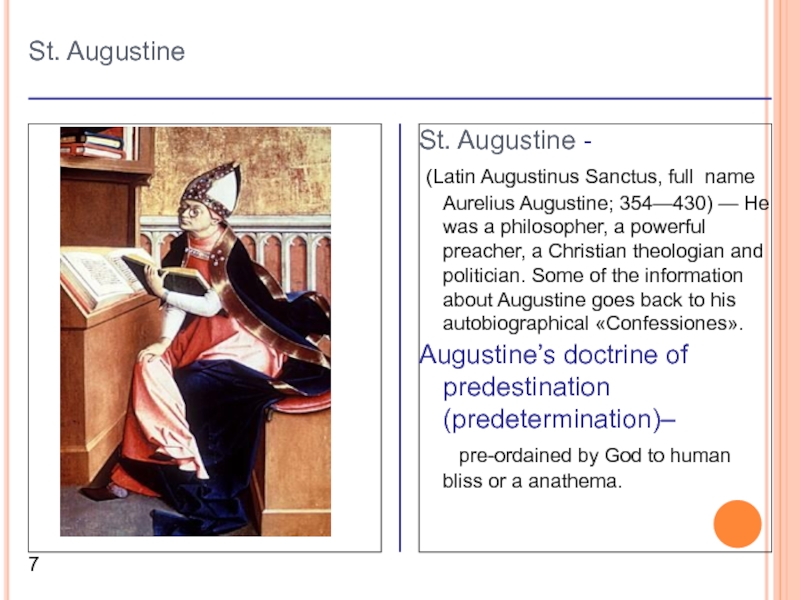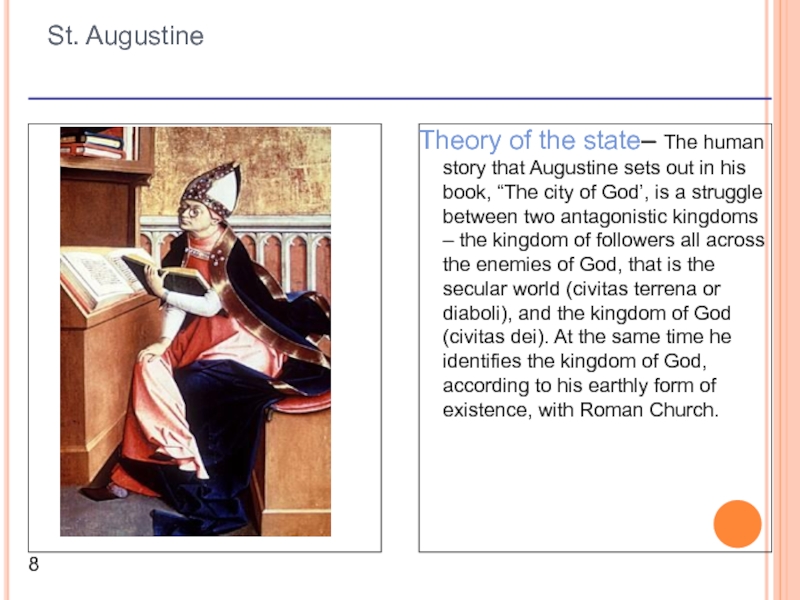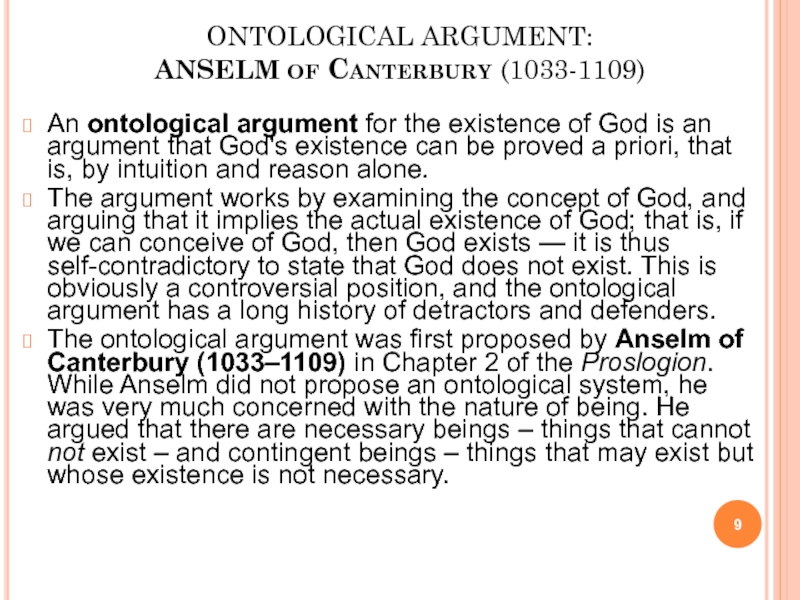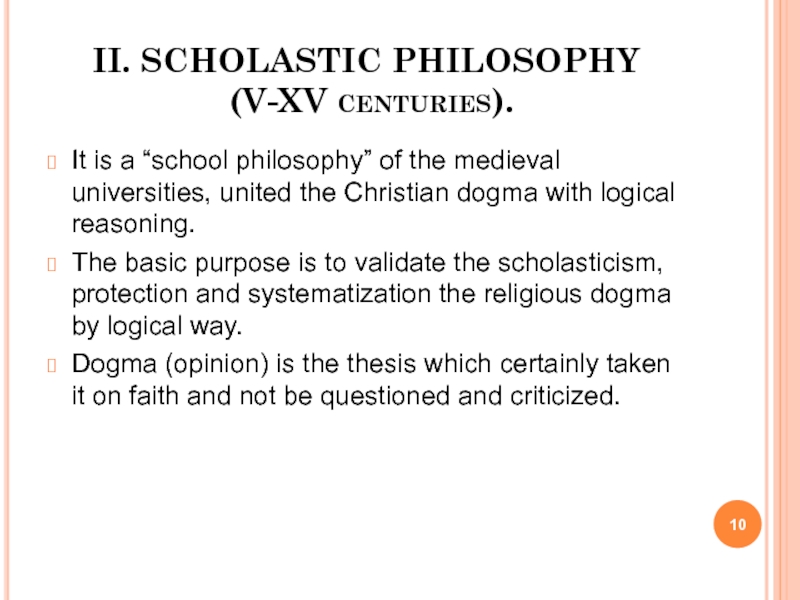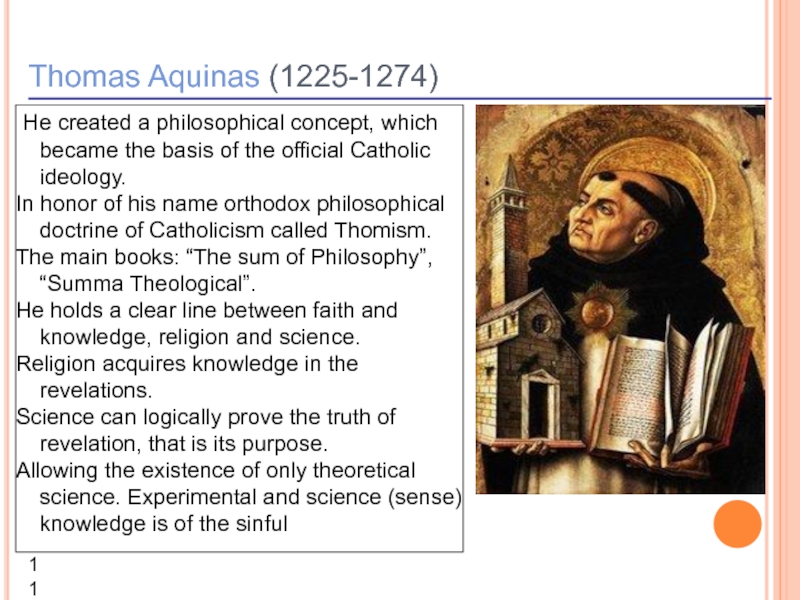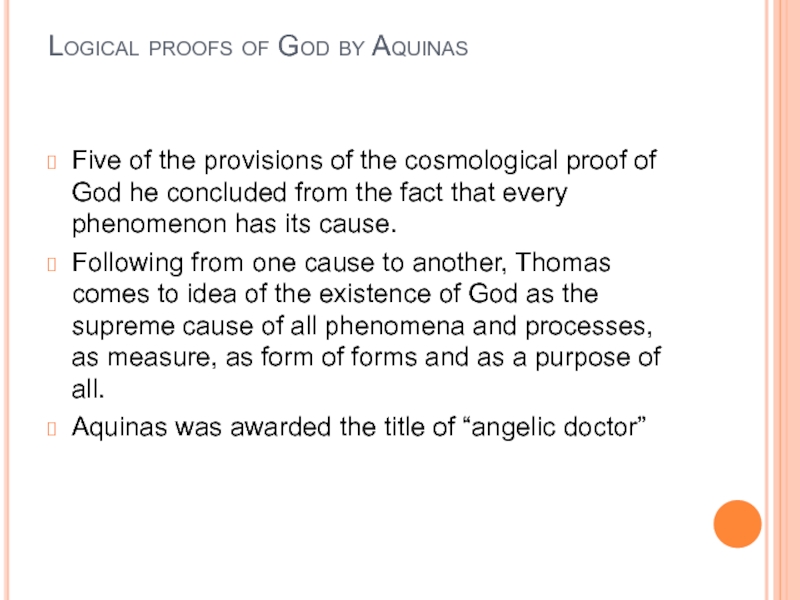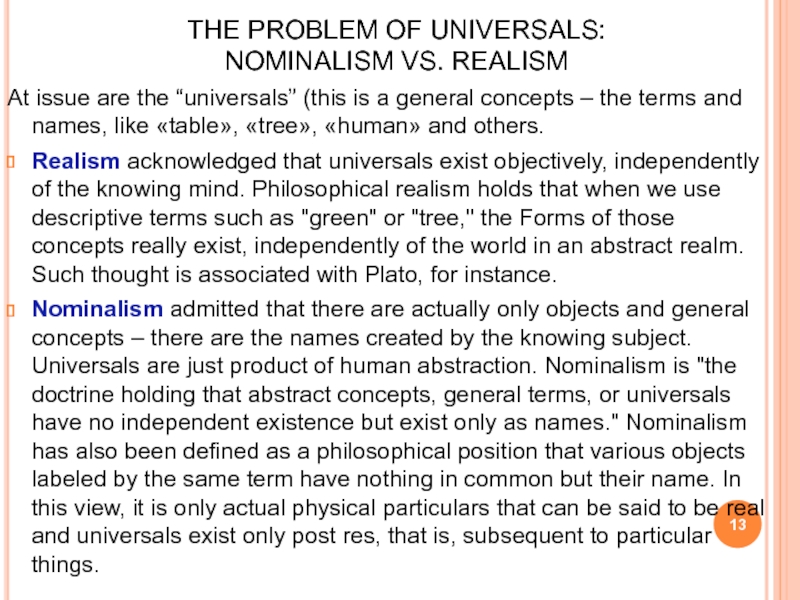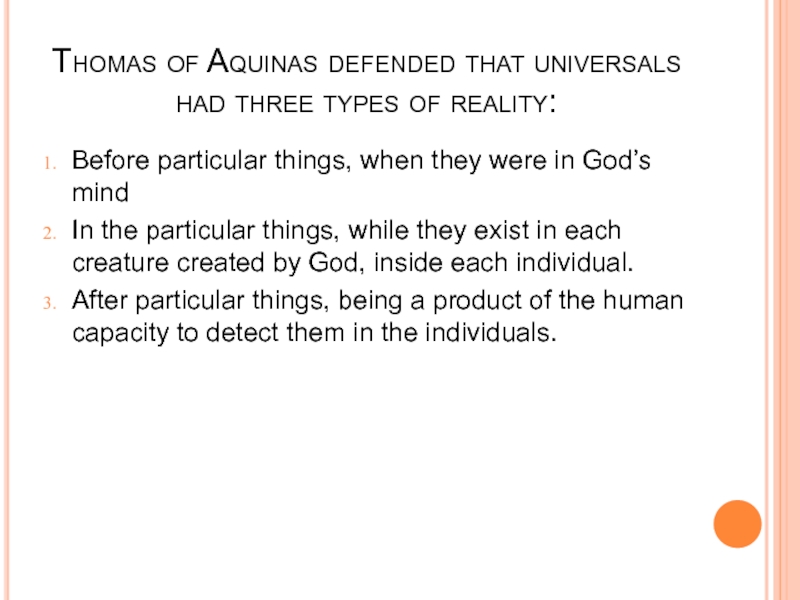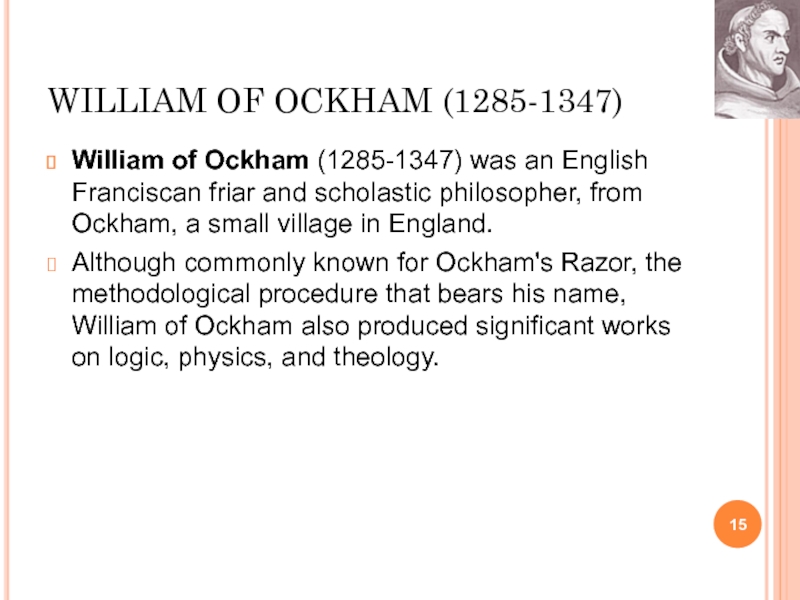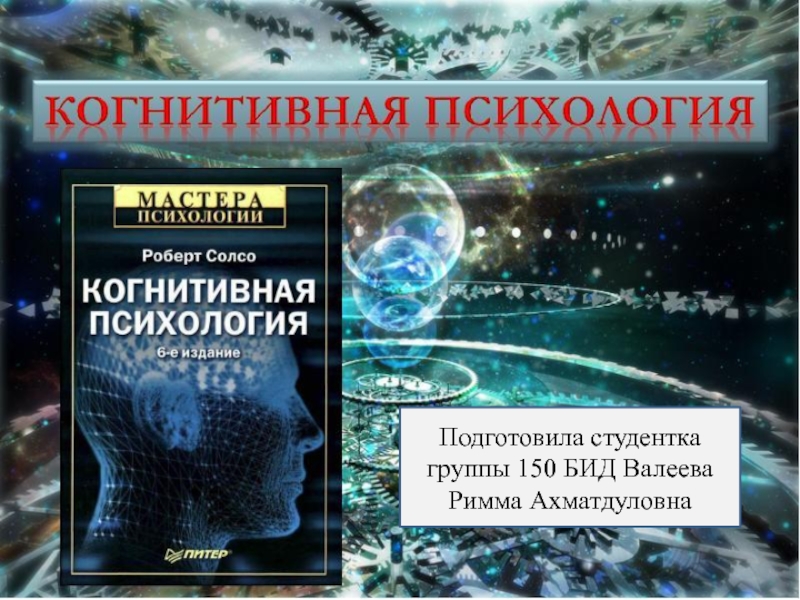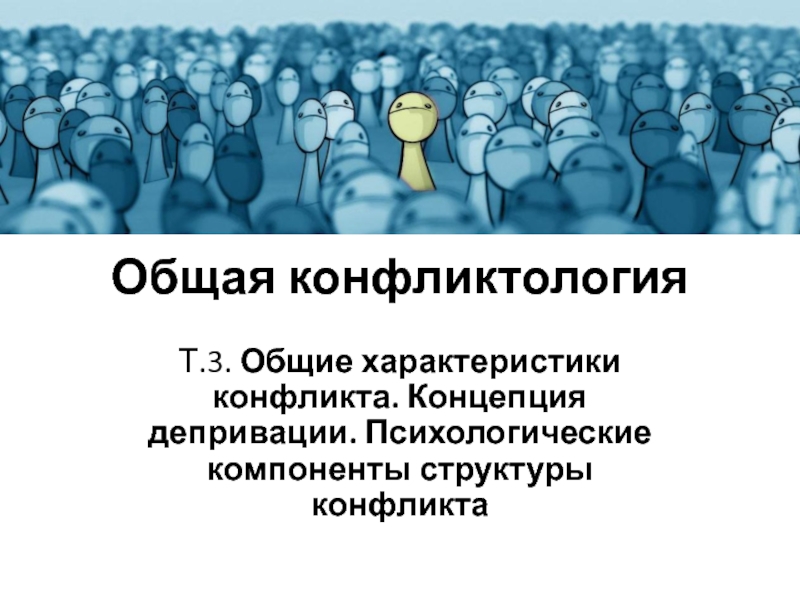Philosophical Writings, c. 1330
- Главная
- Разное
- Дизайн
- Бизнес и предпринимательство
- Аналитика
- Образование
- Развлечения
- Красота и здоровье
- Финансы
- Государство
- Путешествия
- Спорт
- Недвижимость
- Армия
- Графика
- Культурология
- Еда и кулинария
- Лингвистика
- Английский язык
- Астрономия
- Алгебра
- Биология
- География
- Детские презентации
- Информатика
- История
- Литература
- Маркетинг
- Математика
- Медицина
- Менеджмент
- Музыка
- МХК
- Немецкий язык
- ОБЖ
- Обществознание
- Окружающий мир
- Педагогика
- Русский язык
- Технология
- Физика
- Философия
- Химия
- Шаблоны, картинки для презентаций
- Экология
- Экономика
- Юриспруденция
Middle ages philosophy презентация
Содержание
- 1. Middle ages philosophy
- 2. MIDDLE AGE PHILOSOPHY: A SHORT INTRODUCTION
- 3. MIDDLE AGES PHILOSOPHY Two periods can be
- 4. The main theological issues, which were
- 5. I. PATRISTIC PHILOSOPHY. Tertullian, (155–230) Tertullian denounced
- 6. Dionysius the Areopagite Не was a Christian theologian and philosopher of
- 7. Рисунок St. Augustine - (Latin Augustinus
- 8. Рисунок Theory of the state– The human
- 9. ONTOLOGICAL ARGUMENT: ANSELM of Canterbury (1033-1109)
- 10. II. SCHOLASTIC PHILOSOPHY (V-XV centuries).
- 11. He created a philosophical concept, which
- 12. Logical proofs of God by Aquinas Five
- 13. THE PROBLEM OF UNIVERSALS: NOMINALISM VS.
- 14. Thomas of Aquinas defended that universals had
- 15. WILLIAM OF OCKHAM (1285-1347) William of Ockham
Слайд 2MIDDLE AGE PHILOSOPHY:
A SHORT INTRODUCTION
Medieval philosophy is the philosophy of
Western Europe in the "era" now known as medieval or the Middle Ages, the period roughly extending from the fall of the Roman Empire to the Renaissance.
Medieval philosophy is characteristically theological.
Thomas Aquinas, following Peter Damian, argued that philosophy is the handmaiden of theology.
Medieval philosophy is characteristically theological.
Thomas Aquinas, following Peter Damian, argued that philosophy is the handmaiden of theology.
Слайд 3MIDDLE AGES PHILOSOPHY
Two periods can be distinguished: Patristic and Scholastic philosophy.
Patristic
philosophy: “fathers” of the Christian Church making sense of the life of Christ using mainly Platonic Philosophy. Augustine of Hippo
Scholastic philosophy: with the re-apparition of Aristotle’s works a new synthesis is needed appearing plenty of different schools associated with first Universities.
The philosophy of this period is characterized by analysis of the nature and properties of God.
Many of these philosophers took as their starting point the theories of Plato or Aristotle. Others, however, such as Tertullian, rejected Greek philosophy as antithetical to revelation and faith.
Scholastic philosophy: with the re-apparition of Aristotle’s works a new synthesis is needed appearing plenty of different schools associated with first Universities.
The philosophy of this period is characterized by analysis of the nature and properties of God.
Many of these philosophers took as their starting point the theories of Plato or Aristotle. Others, however, such as Tertullian, rejected Greek philosophy as antithetical to revelation and faith.
Слайд 4
The main theological issues, which were connected with main philosophical concepts:
1) the problem of the Trinity,
2) the problem of the incarnation,
3) relation between freedom and Grace,
4) relation between faith and reason
Слайд 5I. PATRISTIC PHILOSOPHY.
Tertullian, (155–230) Tertullian denounced Christian doctrines he considered heretical,
but later in life adopted views that came to be regarded as heretical themselves.
He was the first great writer of Latin Christianity, thus sometimes known as the "father of the Latin Church".
He introduced the term Trinity, as the Latin trinitas, to the Christian vocabulary and also probably of the formula "three Persons, one Substance" as the Latin "tres Personae, una Substantia" and also the terms vetus testamentum ("old testament") and novum testamentum ("new testament").
“I do believe because it is absurd”
Justin (100 – 165) : “ Faith is superior and reason (philosophy) must submit to faith”
He was the first great writer of Latin Christianity, thus sometimes known as the "father of the Latin Church".
He introduced the term Trinity, as the Latin trinitas, to the Christian vocabulary and also probably of the formula "three Persons, one Substance" as the Latin "tres Personae, una Substantia" and also the terms vetus testamentum ("old testament") and novum testamentum ("new testament").
“I do believe because it is absurd”
Justin (100 – 165) : “ Faith is superior and reason (philosophy) must submit to faith”
Слайд 6Dionysius the Areopagite
Не was a Christian theologian and philosopher of the late 5th to early
6th century
Dionysius: Positive and Negative Religious Language
The cornerstone of his religious mysticism is his view that a direct experience of God is so blinding and overpowering that it leaves us in what he calls both an “unapproachable light” and a “dazzling darkness.” The experience is “darkness” insofar as we are incapable of describing anything concrete about it; it is ineffable, meaning that it is unspeakable. Dionysius maintains that we must describe God by way of negation.
In his short work titled Mystical Theology, he discusses the limits of religious language and presents a two-step process that we must take when describing God. First, we begin with positive descriptions by which we attempt to say what God is, such as by saying that God is powerful. Second, realizing the inadequacy of our positive descriptions, we then proceed negatively by denying the positive ascriptions that we made; for example, we deny that God is powerful as humans understand the term “power.” Thus, the more we deny our positive descriptions of God, the closer we get to an understanding of God.
Dionysius: Positive and Negative Religious Language
The cornerstone of his religious mysticism is his view that a direct experience of God is so blinding and overpowering that it leaves us in what he calls both an “unapproachable light” and a “dazzling darkness.” The experience is “darkness” insofar as we are incapable of describing anything concrete about it; it is ineffable, meaning that it is unspeakable. Dionysius maintains that we must describe God by way of negation.
In his short work titled Mystical Theology, he discusses the limits of religious language and presents a two-step process that we must take when describing God. First, we begin with positive descriptions by which we attempt to say what God is, such as by saying that God is powerful. Second, realizing the inadequacy of our positive descriptions, we then proceed negatively by denying the positive ascriptions that we made; for example, we deny that God is powerful as humans understand the term “power.” Thus, the more we deny our positive descriptions of God, the closer we get to an understanding of God.
Слайд 7Рисунок
St. Augustine -
(Latin Augustinus Sanctus, full name Aurelius Augustine; 354—430)
— He was a philosopher, a powerful preacher, a Christian theologian and politician. Some of the information about Augustine goes back to his autobiographical «Confessiones».
Augustine’s doctrine of predestination (predetermination)–
pre-ordained by God to human bliss or a anathema.
Augustine’s doctrine of predestination (predetermination)–
pre-ordained by God to human bliss or a anathema.
St. Augustine
Слайд 8Рисунок
Theory of the state– The human story that Augustine sets out
in his book, “The city of God’, is a struggle between two antagonistic kingdoms – the kingdom of followers all across the enemies of God, that is the secular world (civitas terrena or diaboli), and the kingdom of God (civitas dei). At the same time he identifies the kingdom of God, according to his earthly form of existence, with Roman Church.
St. Augustine
Слайд 9ONTOLOGICAL ARGUMENT:
ANSELM of Canterbury (1033-1109)
An ontological argument for the
existence of God is an argument that God's existence can be proved a priori, that is, by intuition and reason alone.
The argument works by examining the concept of God, and arguing that it implies the actual existence of God; that is, if we can conceive of God, then God exists — it is thus self-contradictory to state that God does not exist. This is obviously a controversial position, and the ontological argument has a long history of detractors and defenders.
The ontological argument was first proposed by Anselm of Canterbury (1033–1109) in Chapter 2 of the Proslogion. While Anselm did not propose an ontological system, he was very much concerned with the nature of being. He argued that there are necessary beings – things that cannot not exist – and contingent beings – things that may exist but whose existence is not necessary.
The argument works by examining the concept of God, and arguing that it implies the actual existence of God; that is, if we can conceive of God, then God exists — it is thus self-contradictory to state that God does not exist. This is obviously a controversial position, and the ontological argument has a long history of detractors and defenders.
The ontological argument was first proposed by Anselm of Canterbury (1033–1109) in Chapter 2 of the Proslogion. While Anselm did not propose an ontological system, he was very much concerned with the nature of being. He argued that there are necessary beings – things that cannot not exist – and contingent beings – things that may exist but whose existence is not necessary.
Слайд 10II. SCHOLASTIC PHILOSOPHY
(V-XV centuries).
It is a “school philosophy” of
the medieval universities, united the Christian dogma with logical reasoning.
The basic purpose is to validate the scholasticism, protection and systematization the religious dogma by logical way.
Dogma (opinion) is the thesis which certainly taken it on faith and not be questioned and criticized.
The basic purpose is to validate the scholasticism, protection and systematization the religious dogma by logical way.
Dogma (opinion) is the thesis which certainly taken it on faith and not be questioned and criticized.
Слайд 11 He created a philosophical concept, which became the basis of
the official Catholic ideology.
In honor of his name orthodox philosophical doctrine of Catholicism called Thomism.
The main books: “The sum of Philosophy”, “Summa Theological”.
He holds a clear line between faith and knowledge, religion and science.
Religion acquires knowledge in the revelations.
Science can logically prove the truth of revelation, that is its purpose.
Allowing the existence of only theoretical science. Experimental and science (sense) knowledge is of the sinful
In honor of his name orthodox philosophical doctrine of Catholicism called Thomism.
The main books: “The sum of Philosophy”, “Summa Theological”.
He holds a clear line between faith and knowledge, religion and science.
Religion acquires knowledge in the revelations.
Science can logically prove the truth of revelation, that is its purpose.
Allowing the existence of only theoretical science. Experimental and science (sense) knowledge is of the sinful
Thomas Aquinas (1225-1274)
Слайд 12Logical proofs of God by Aquinas
Five of the provisions of the
cosmological proof of God he concluded from the fact that every phenomenon has its cause.
Following from one cause to another, Thomas comes to idea of the existence of God as the supreme cause of all phenomena and processes, as measure, as form of forms and as a purpose of all.
Aquinas was awarded the title of “angelic doctor”
Following from one cause to another, Thomas comes to idea of the existence of God as the supreme cause of all phenomena and processes, as measure, as form of forms and as a purpose of all.
Aquinas was awarded the title of “angelic doctor”
Слайд 13THE PROBLEM OF UNIVERSALS:
NOMINALISM VS. REALISM
At issue are the “universals”
(this is a general concepts – the terms and names, like «table», «tree», «human» and others.
Realism acknowledged that universals exist objectively, independently of the knowing mind. Philosophical realism holds that when we use descriptive terms such as "green" or "tree," the Forms of those concepts really exist, independently of the world in an abstract realm. Such thought is associated with Plato, for instance.
Nominalism admitted that there are actually only objects and general concepts – there are the names created by the knowing subject. Universals are just product of human abstraction. Nominalism is "the doctrine holding that abstract concepts, general terms, or universals have no independent existence but exist only as names." Nominalism has also been defined as a philosophical position that various objects labeled by the same term have nothing in common but their name. In this view, it is only actual physical particulars that can be said to be real and universals exist only post res, that is, subsequent to particular things.
Realism acknowledged that universals exist objectively, independently of the knowing mind. Philosophical realism holds that when we use descriptive terms such as "green" or "tree," the Forms of those concepts really exist, independently of the world in an abstract realm. Such thought is associated with Plato, for instance.
Nominalism admitted that there are actually only objects and general concepts – there are the names created by the knowing subject. Universals are just product of human abstraction. Nominalism is "the doctrine holding that abstract concepts, general terms, or universals have no independent existence but exist only as names." Nominalism has also been defined as a philosophical position that various objects labeled by the same term have nothing in common but their name. In this view, it is only actual physical particulars that can be said to be real and universals exist only post res, that is, subsequent to particular things.
Слайд 14Thomas of Aquinas defended that universals had three types of reality:
Before
particular things, when they were in God’s mind
In the particular things, while they exist in each creature created by God, inside each individual.
After particular things, being a product of the human capacity to detect them in the individuals.
In the particular things, while they exist in each creature created by God, inside each individual.
After particular things, being a product of the human capacity to detect them in the individuals.
Слайд 15WILLIAM OF OCKHAM (1285-1347)
William of Ockham (1285-1347) was an English Franciscan
friar and scholastic philosopher, from Ockham, a small village in England.
Although commonly known for Ockham's Razor, the methodological procedure that bears his name, William of Ockham also produced significant works on logic, physics, and theology.
Although commonly known for Ockham's Razor, the methodological procedure that bears his name, William of Ockham also produced significant works on logic, physics, and theology.
